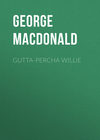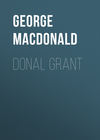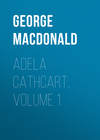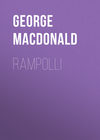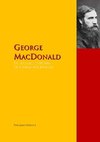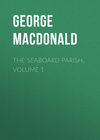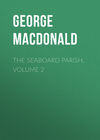Loe raamatut: «Alec Forbes of Howglen», lehekülg 18
CHAPTER XLII
The next Saturday but one Alec received a note from Mr Fraser, hoping that his new cousin had not driven him away, and inviting him to dine that same afternoon.
He went. After dinner the old man fell asleep in his chair.
"Where were you born?" Alec asked Kate.
She was more like his first impression of her.
"Don't you know?" she replied. "In the north of Sutherlandshire—near the foot of a great mountain, from the top of which, on the longest day, you can see the sun, or a bit of him at least, all night long."
"How glorious!" said Alec.
"I don't know. I never saw him. And the winters are so long and terrible! Nothing but snowy hills about you, and great clouds always coming down with fresh loads of snow to scatter over them."
"Then you don't want to go back?"
"No. There is nothing to make me wish to go back. There is no one there to love me now."
She looked very sad for a few moments.
"Yes," said Alec, thoughtfully; "a winter without love must be dreadful. But I like the winter; and we have plenty of it in our quarter too."
"Where is your home?"
"Not many miles north of this."
"Is it a nice place?"
"Of course I think so."
"Ah! you have a mother. I wish I knew her."
"I wish you did.—True: the whole place is like her to me. But I don't think everybody would admire it. There are plenty of bare snowy hills there too in winter. But I think the summers and the harvests are as delightful as anything can be, except—"
"Except what?"
"Don't make me say what will make you angry with me."
"Now you must, else I shall fancy something that will make me more angry."
"Except your face, then," said Alec, frightened at his own boldness, but glancing at her shyly.
She flushed a little, but did not look angry.
"I don't like that," she said. "It makes one feel awkward."
"At least," rejoined Alec, emboldened, "you must allow it is your own fault."
"I can't help my face," she said, laughing.
"Oh! you know what I mean. You made me say it."
"Yes, after you had half-said it already. Don't do it again."
And there followed more of such foolish talk, uninteresting to my readers.
"Where were you at school?" asked Alec, after a pause. "Your uncle told me you were at school."
"Near London," she answered.
"Ah! that accounts for your beautiful speech."
"There again. I declare I will wake my uncle if you go on in that way."
"I beg your pardon," protested Alec; "I forgot."
"But," she went on, "in Sutherlandshire we don't talk so horribly as they do here."
"I daresay not," returned Alec, humbly.
"I don't mean you. I wonder how it is that you speak so much better than all the people here."
"I suppose because my mother speaks well. She never lets me speak broad
Scotch to her."
"Your mother again! She's everything to you."
Alec did not reply.
"I should like to see her," pursued Kate.
"You must come and see her, then."
"See whom?" asked Mr Fraser, rousing himself from his nap.
"My mother, sir," answered Alec.
"Oh! I thought you had been speaking of Katie's friend," said the professor, and fell asleep again.
"Uncle means Bessie Warner, who is coming by the steamer from London on
Monday. Isn't it kind of uncle to ask her to come and see me here?"
"He is kind always. Was Miss Warner a schoolfellow of yours?"
"Yes—no—not exactly. She was one of the governesses. I must go and meet her at the steamer. Will you go with me?"
"I shall be delighted. Do you know when she arrives?"
"They say about six. I daresay it is not very punctual."
"Oh! yes, she is—when the weather is decent. I will make inquiries, and come and fetch you."
"Thank you.—I suppose I may, uncle?"
"What, my dear?" said the professor, rousing himself again.
"Have my cousin to take care of me when I go to meet Bessie?"
"Yes, certainly. I shall be much obliged to you, Mr Forbes. I am not quite so agile as I was at your age, though my gouty leg is better."
This conversation would not have been worth recording were it not that it led to the walk and the waiting on Monday.—They found, when they reached the region of steamers, that she had not yet been signalled, but her people were expecting the signal every minute. So Alec and Kate walked out along the pier, to pass the time. This pier runs down the side of the river, and a long way into the sea. It had begun to grow dark, and Alec had to take great care of Kate amongst the tramways, coils of rope, and cables that crossed their way. At length they got clear of these, and found themselves upon the pier, built of great rough stones—lonely and desert, tapering away into the dark, its end invisible, but indicated by the red light far in front.
"It is a rough season of the year for a lady to come by sea," said
Alec.
"Bessie is very fond of the sea," answered Kate. "I hope you will like her, Mr Forbes."
"Do you want me to like her better than you?" rejoined Alec. "Because if you do—"
"Look how beautiful that red light is on the other side of the river," interrupted Kate. "And there is another further out."
"When the man at the helm gets those two lights in a line," said Alec, "he may steer straight in, in the darkest night—that is, if the tide serves for the bar."
"Look how much more glorious the red shine is on the water below!" said
Kate.
"It looks so wet!" returned Alec,—"just like blood."
He almost cursed himself as he said so, for he felt Kate's hand stir as if she would withdraw it from his arm. But after fluttering like a bird for a moment, it settled again upon its perch, and there rested.
The day had been quite calm, but now a sudden gust of wind from the north-east swept across the pier and made Kate shiver. Alec drew her shawl closer about her, and her arm further within his. They were now close to the sea. On the other side of the wall which rose on their left, they could hear the first of the sea-waves. It was a dreary place—no sound even indicating the neighbourhood of life. On one side, the river below them went flowing out to the sea in the dark, giving a cold sluggish gleam now and then, as if it were a huge snake heaving up a bend of its wet back, as it hurried away to join its fellows; on the other side rose a great wall of stone, beyond which was the sound of long waves following in troops out of the dark, and falling upon a low moaning coast. Clouds hung above the sea; and above the clouds two or three disconsolate stars.
"Here is a stair," said Alec. "Let us go up on the top of the sea-wall, and then we shall catch the first glimpse of the light at her funnel."
They climbed the steep rugged steps, and stood on the broad wall, hearing the sea-pulses lazily fall at its foot. The wave crept away after it fell, and returned to fall again like a weary hound. There was hardly any life in the sea. How mournful it was to lie out there, the wintry night, beneath an all but starless heaven, with the wind vexing it when it wanted to sleep!
Alec feeling Kate draw a deep breath like the sigh of the sea, looked round in her face. There was still light enough to show it frowning and dark and sorrowful and hopeless. It was in fact a spiritual mirror, which reflected in human forms the look of that weary waste of waters. She gave a little start, gathered herself together, and murmured something about the cold.
"Let us go down again," said Alec.—"The wind has risen considerably, and the wall will shelter us down below."
"No, no," she answered; "I like it. We can walk here just as well. I don't mind the wind."
"I thought you were afraid of falling off."
"No, not in the dark. I should be, I daresay, if I could see how far we are from the bottom."
So they walked on. The waves no longer fell at the foot of the wall, but leaned their breasts against it, gleaming as they rose on its front, and darkening as they sank low towards its deep base.
The wind kept coming in gusts, tearing a white gleam now and then on the dark surface of the sea. Behind them shone the dim lights of the city; before them all was dark as eternity, except for the one light at the end of the pier. At length Alec spied another out at sea.
"I believe that is the steamer," he said. "But she is a good way off. We shall have plenty of time to walk to the end—that is, if you would like to go."
"Certainly; let us go on. I want to stand on the very point," answered
Kate.
They soon came to the lighthouse on the wall, and there descended to the lower part of the pier, the end of which now plunged with a steep descent into the sea. It was constructed of great stones clamped with iron, and built into a natural foundation of rock. Up the slope the waves rushed, and down the slope they sank again, with that seemingly aimless and resultless rise and fall, which makes the sea so dreary and sad to those men and women who are not satisfied without some goal in view, some outcome of their labours; for it goes on and on, answering ever to the call of sun and moon, and the fierce trumpet of the winds, yet working nothing but the hopeless wear of the bosom in which it lies bound for ever.
They stood looking out into the great dark before them, dark air, dark sea, dark sky, watching the one light which grew brighter as they gazed. Neither of them saw that a dusky figure was watching them from behind a great cylindrical stone that stood on the end of the pier, close to the wall.
A wave rushed up almost to their feet.
"Let us go," said Kate, with a shiver. "I can't bear it longer. The water is calling me and threatening me. There! How that wave rushed up as if it wanted me at once!"
Alec again drew her closer to him, and turning, they walked slowly back. He was silent with the delight of having that lovely creature all to himself, leaning on his arm, in the infolding and protecting darkness, and Kate was likewise silent.
By the time they reached the quay at the other end of the pier, the steamer had crossed the bar, and they could hear the thud of her paddles treading the water beneath them, as if eagerly because she was near her rest. After a few struggles, she lay quiet in her place, and they went on board.
Alec saw Kate embrace a girl perhaps a little older than herself, helped her to find her luggage, put them into a chaise, took his leave, and went home.
He did not know that all the way back along the pier they had been followed by Patrick Beauchamp.
CHAPTER XLIII
Excited, and unable to settle to his work, Alec ran upstairs to Mr Cupples, whom he had not seen for some days. He found him not more than half-way towards his diurnal goal.
"What's come o' you, bantam, this mony a day?" said Mr Cupples.
"I saw ye last Saturday," said Alec.
"Last Setterday week, ye mean," rejoined the librarian. "Hoo's the mathematics comin' on?"
"To tell the truth, I'm raither ahin' wi' them," answered Alec.
"I was thinkin' as muckle. Rainbows! Thae rainbows! And the anawtomy?"
"Nae jist stan'in' still a'thegither."
"That's weel. Ye haena been fa'in' asleep again ower the guddlet carcass o' an auld pauper—hae ye?"
Alec stared. He had never told any one of his adventure in the dissecting-room.
"I saw ye, my man. But I wasna the only ane that saw ye. Ye micht hae gotten a waur fleg gin I hadna come up, for Mr Beauchamp was takin' the bearin's o' ye throu the window, and whan I gaed up, he slippit awa' like a wraith. There ye lay, wi' yer heid back, and yer mou' open, as gin you and the deid man had been tryin' whilk wad sleep the soun'est. But ye hae ta'en to ither studies sin' syne. Ye hae a freah subject—a bonnie young ane. The Lord hae mercy upo' ye! The goddess o' the rainbow hersel's gotten a haud o' ye, and ye'll be seein' naething but rainbows for years to come.—Iris bigs bonnie brigs, but they hae nowther pier, nor buttress, nor key-stane, nor parapet. And no fit can gang ower them but her ain, and whan she steps aff, it's upo' men's herts, and yours can ill bide her fit, licht as it may be."
"What are ye propheseein' at, Mr Cupples?" said Alec, who did not more than half understand him.
"Verra weel. I'm no drunk yet," rejoined Mr Cupples, oracularly. "But that chield Beauchamp's no rainbow—that lat me tell ye. He'll do you a mischeef yet, gin ye dinna luik a' the shairper. I ken the breed o' him. He was luikin' at ye throu the window like a hungry deevil. And jist min' what ye're aboot wi' the lassie—she's rael bonnie—or ye may chance to get her into trouble, withoot ony wyte (fault) o' yer ain. Min' I'm tellin' ye. Gin ye'll tak my advice, ye'll tak a dose o' mathematics direckly. It's a fine alterative as weel as antidote, though maybe whusky's…..the verra broo o' the deevil's ain pot," he concluded, altering his tone entirely, and swallowing the rest of his glass at a gulp.
"What do ye want me to do?" asked Alec.
"To tak tent (care) o' Beauchamp. And meantime to rin doon for yer
Euclid and yer Hutton, and lat's see whaur ye are."
There was more ground for Mr Cupples's warning than Alec had the smallest idea of. He had concluded long ago that all possible relations, even those of enmity—practical enmity at least—were over between them, and that Mr Beauchamp considered the bejan sufficiently punished for thrashing him, by being deprived of his condescending notice for the rest of the ages. But so far was this from being the true state of the case, that, although Alec never suspected it, Beauchamp had in fact been dogging and haunting him from the very commencement of the session, and Mr Cupples had caught him in only one of many acts of the kind. In the anatomical class, where they continued to meet, he still attempted to keep up the old look of diadain, as if the lesson he had received had in no way altered their relative position. Had Alec known with what difficulty, and under what a load of galling recollection, he kept it up, he would have been heartily sorry for him. Beauchamp's whole consciousness was poisoned by the memory of that day. Incapable of regarding any one except in comparative relation to himself, the effort of his life had been to maintain that feeling of superiority with which he started every new acquaintance; for occasionally a flash of foreign individuality would break through the husk of satisfaction in which he had inclosed himself, compelling him to feel that another man might have claims. And hitherto he had been very successful in patching up and keeping entire his eggshell of conceit. But that affair with Alec was a very bad business. Had Beauchamp been a coward, he would have suffered less from it. But he was no coward, though not quite so courageous as Hector, who yet turned and fled before Achilles. Without the upholding sense of duty, no man can be sure of his own behaviour, simply because he cannot be sure of his own nerves. Duty kept the red-cross knight "forlorne and left to losse," "haplesse and eke hopelesse,"
"Disarmd, disgraste, and inwardly dismayde,
And eke so faint in every joynt and vayne,"
from turning his back on the giant Orgoglio, and sent him pacing towards him with feeble steps instead. But although he was not wanting in mere animal courage, Beauchamp's pride always prevented him from engaging in any contest in which he was not sure of success, the thought of failure being to him unendurable. When he found that he had miscalculated the probabilities, he was instantly dismayed; and the blow he received on his mouth reminding his vanity of the danger his handsome face was in, he dropped his arms and declined further contest, comforting himself with the fancy of postponing his vengeance to a better opportunity.
But within an hour he knew that he had lost his chance, as certainly as he who omits the flood-tide of his fortune. He not only saw that he was disgraced, but felt in himself that he had been cowardly; and, more mortifying still, felt that, with respect to the clodhopper, he was cowardly now. He was afraid of him. Nor could he take refuge in the old satisfaction of despising him; for that he found no longer possible. He was on the contrary compelled to despise himself, an experience altogether new; so that his contempt for Alec changed into a fierce, slow-burning hate.
Now hate keeps its object present even more than the opposite passion. Love makes everything lovely; hate concentrates itself on the one thing hated. The very sound of Alec's voice became to the ears of Beauchamp what a filthy potion would have been to his palate. Every line of his countenance became to his eyes what a disgusting odour would have been to his nostrils. And yet the fascination of his hate, and his desire of revenge, kept Beauchamp's ears, eyes, and thoughts hovering about Forbes.
No way of gratifying his hatred, however, although he had been brooding over it all the previous summer, had presented itself till now. Now he saw the possibility of working a dear revenge. But even now, to work surely, he must delay long. Still the present consolation was great.
Nor is it wonderful that his pride should not protect him from the deeper disgrace of walking in underground ways. For there is nothing in the worship of self to teach a man to be noble. Honour even will one day fail him who has learned no higher principle. And although revenge be "a kind of wild justice," it loses the justice, and retains only the wildness, when it corrupts into hatred. Every feeling that Beauchamp had was swallowed up in the gulf eaten away by that worst of all canker-worms.
Notwithstanding the humiliation he had experienced, he retained as yet an unlimited confidence in some gifts which he supposed himself to possess by nature, and to be capable of using with unequalled art. And true hate, as well as true love, knows how to wait.
CHAPTER XLIV
In the course of her study of Milton, Annie had come upon Samson's lamentation over his blindness; and had found, soon after, the passage in which Milton, in his own person, bewails the loss of light. The thought that she would read them to Tibbie Dyster was a natural one. She borrowed the volumes from Mrs Forbes; and, the next evening, made her way to Tibbie's cottage, where she was welcomed as usual by her gruff voice of gratefulness.
"Ye're a gude bairn to come a' this gait through the snaw to see an auld blin' body like me. It's dingin' on (snowing or raining)—is na 't, bairn?"
"Ay is't. Hoo do ye ken, Tibbie?"
"I dinna ken hoo I ken. I was na sure. The snaw maks unco little din, ye see. It comes doon like the speerit himsel' upo' quaiet herts."
"Did ye ever see, Tibbie?" asked Annie, after a pause.
"Na; nae that I min' upo'. I was but twa year auld, my mither used to tell fowk, whan I had the pock, an' it jist closed up my een for ever—i' this warl, ye ken. I s' see some day as weel's ony o' ye, lass."
"Do ye ken what licht is, Tibbie?" said Annie, whom Milton had set meditating on Tibbie's physical in relation to her mental condition.
"Ay, weel eneuch," answered Tibbie, with a touch of indignation at the imputed ignorance. "What for no? What gars ye spier?"
"Ow! I jist wanted to ken."
"Hoo could I no ken? Disna the Saviour say: 'I am the licht o' the warl?'—He that walketh in Him maun ken what licht is, lassie. Syne ye hae the licht in yersel—in yer ain hert; an' ye maun ken what it is. Ye canna mistak' it."
Annie was neither able nor willing to enter into an argument on the matter, although she was not satisfied. She would rather think than dispute about it. So she changed the subject in a measure.
"Did ye ever hear o' John Milton, Tibbie?" she asked.
"Ow! ay. He was blin' like mysel,' wasna he?"
"Ay, was he. I hae been readin' a heap o' his poetry."
"Eh! I wad richt weel like to hear a bittie o' 't."
"Weel, here's a bit 'at he made as gin Samson was sayin' o' 't, till himsel' like, efter they had pitten oot's een—the Phillisteens, ye ken."
"Ay, I ken weel eneuch. Read it."
Annie read the well-known passage. Tibbie listened to the end, without word of remark or question, her face turned towards the reader, and her sightless balls rolling under their closed lids. When Annie's voice ceased, she said, after a little reflection:
"Ay! ay! It's bonnie, an' verra true. And, puir man! it was waur for him nor for me and Milton; for it was a' his ain wyte; and it was no to be expecket he cud be sae quaiet as anither. But he had no richt to queston the ways o' the Maker. But it's bonnie, rael bonnie."
"Noo, I'll jist read to ye what Milton says aboot his ain blin'ness.
But it's some ill to unnerstan'."
"Maybe I'll unnerstan' 't better nor you, bairn. Read awa'."
So admonished, Annie read. Tibbie fidgeted about on her seat. It was impossible either should understand it. And the proper names were a great puzzle to them.
"Tammy Riss!" said Tibbie; "I ken naething aboot him."
"Na, neither do I," said Annie; and beginning the line again, she blundered over "blind Maeonides."
"Ye're readin' 't wrang, bairn. It sud be 'nae ony days,' for there's nae days or nichts either to the blin'. They dinna ken the differ, ye see."
"I'm readin' 't as I hae't," answered Annie. "It's a muckle M."
"I ken naething aboot yer muckle or yer little Ms," retorted Tibbie, with indignation. "Gin that binna what it means, it's ayont me. Read awa'. Maybe we'll come to something better."
"Ay will we?" said Annie, and resumed.
With the words, "Thus with the year seasons return," Tibbie's attention grew fixed; and when the reader came to the passage,
"So much the rather thou, Celestial Light,
Shine inward,"
her attention rose into rapture.
"Ay, ay, lassie! That man kent a' aboot it! He wad never hae speired gin a blin' crater like me kent what the licht was. He kent what it was weel. Ay did he!"
"But, ye see, he was a gey auld man afore he tint his eesicht," Annie ventured to interpose.
"Sae muckle the better! He kent baith kinds. And he kent that the sicht without the een is better nor the sicht o' the een. Fowk nae doobt has baith; but I think whiles 'at the Lord gies a grainy mair o' the inside licht to mak' up for the loss o' the ootside; and weel I wat it doesna want muckle to do that."
"But ye dinna ken what it is," objected Annie, with unnecessary persistency in the truth.
"Do ye tell me that again?" returned Tibbie, harshly. "Ye'll anger me, bairn. Gin ye kent hoo I lie awauk at nicht, no able to sleep for thinkin' 'at the day will come whan I'll see—wi' my ain open een—the verra face o' him that bore oor griefs an' carried oor sorrows, till I jist lie and greit, for verra wissin', ye wadna say 'at I dinna ken what the sicht o' a body's een is. Sae nae mair o' that! I beg o' ye, or I'll jist need to gang to my prayers to haud me ohn been angry wi' ane o' the Lord's bairns; for that ye are, I do believe, Annie Anderson. Ye canna ken what blin'ness is; but I doobt ye ken what the licht is, lassie; and, for the lave (rest), jist ye lippen (trust) to John Milton and me."
Annie dared not say another word. She sat silent—perhaps rebuked. But
Tibbie resumed:
"Ye maunna think, hooever, 'cause sic longin' thouchts come ower me, that I gang aboot the hoose girnin' and compleenin' that I canna open the door and win oot. Na, na. I could jist despise the licht, whiles, that ye mak' sic a wark aboot, and sing and shout, as the Psalmist says; for I'm jist that glaid, that I dinna ken hoo to haud it in. For the Lord's my frien'. I can jist tell him a' that comes into my puir blin' heid. Ye see there's ither ways for things to come intil a body's heid. There's mair doors nor the een. There's back doors, whiles, that lat ye oot to the bonnie gairden, and that's better nor the road-side. And the smell o' the braw flooers comes in at the back winnocks, ye ken.—Whilk o' the bonnie flooers do ye think likest Him, Annie Anderson?"
"Eh! I dinna ken, Tibbie. I'm thinkin' they maun be a' like him."
"Ay, ay, nae doobt. But some o' them may be liker him nor ithers."
"Weel, whilk do ye think likest him, Tibbie?"
"I think it maun be the minnonette—sae clean and sae fine and sae weel content."
"Ay, ye're speiken by the smell, Tibbie. But gin ye saw the rose—"
"Hoots! I hae seen the rose mony a time. Nae doobt it's bonnier to luik at—" and here her fingers went moving about as if they were feeling the full-blown sphere of a rose—"but I think, for my pairt, that the minnonette's likest Him."
"May be," was all Annie's reply, and Tibbie went on.
"There maun be faces liker him nor ithers. Come here, Annie, and lat me fin (feel) whether ye be like him or no."
"Hoo can ye ken that?—ye never saw him."
"Never saw him! I hae seen him ower and ower again. I see him whan I like. Come here, I say."
Annie went and knelt down beside her, and the blind woman passed her questioning fingers in solemn silence over and over the features of the child. At length, with her hands still resting upon Annie's head, she uttered her judgment.
"Ay. Some like him, nae doot. But she'll be a heap liker him whan she sees him as he is."
When a Christian proceeds to determine the rightness of his neighbour by his approximation to his fluctuating ideal, it were well if the judgment were tempered by such love as guided the hands of blind Tibbie over the face of Annie in their attempt to discover whether or not she was like the Christ of her visions.
"Do ye think ye're like him, Tibbie?" said Annie with a smile, which
Tibbie at once detected in the tone.
"Hoots, bairn! I had the pock dreidfu', ye ken."
"Weel, maybe we a' hae had something or ither that hauds us ohn been sae bonny as we micht hae been. For ae thing, there's the guilt o' Adam's first sin, ye ken."
"Verra richt, bairn. Nae doot that's blaudit mony a face—'the want o' original richteousness, and the corruption o' our whole natur'.' The wonner is that we're like him at a'. But we maun be like him, for he was a man born o' a wumman.' Think o' that, lass!"
At this moment the latch of the door was lifted, and in walked Robert Bruce. He gave a stare when he saw Annie, for he had thought her out of the way at Howglen, and said in a tone of asperity,
"Ye're a' gait at ance, Annie Anderson. A doonricht rintheroot!"
"Lat the bairn be, Maister Bruce," said Tibbie. "She's doin' the Lord's will, whether ye may think it or no. She's visitin' them 'at's i' the prison-hoose o' the dark. She's ministerin' to them 'at hae mony preeviledges nae doot, but hae room for mair."
"I'm no saying naething," said Bruce.
"Ye are sayin'. Ye're offendin' ane o' his little anes. Tak ye tent o' the millstane."
"Hoot toot! Tibbie. I was only wissin 'at she wad keep a sma' part o' her ministrations for her ain hame and her ain fowk 'at has the ministerin' to her. There's the mistress and me jist mairtyrs to that chop! And there's the bit infant in want o' some ministration noo and than, gin that be what ye ca' 't."
A grim compression of the mouth was all Tibbie's reply. She did not choose to tell Robert Bruce that although she was blind—and probably because she was blind—she heard rather more gossip than anybody else in Glamerton, and that consequently his appeal to her sympathy had no effect upon her. Finding she made no other answer, Bruce turned to Annie.
"Noo, Annie," said he, "ye're nae wantit here ony langer. I hae a word or twa to say to Tibbie. Gang hame and learn yer lessons for the morn."
"It's Setterday nicht," answered Annie.
"But ye hae yer lessons to learn for the Mononday."
"Ow ay! But I hae a buik or twa to tak' hame to Mistress Forbes. And I daursay I'll bide, and come to the kirk wi' her i' the mornin'."
Now, although all that Bruce wanted was to get rid of her, he went on to oppose her; for common-minded people always feel that they give the enemy an advantage if they show themselves content.
"It's no safe to rin aboot i' the mirk (dark). It's dingin' on forbye. Ye'll be a' wat, and maybe fa' into the dam. Ye couldna see yer han' afore yer face—ance oot o' the toon."
"I ken the road to Mistress Forbes's as weel's the road up your garret-stairs, Mr Bruce."
"Ow nae doobt!" he answered, with a sneering acerbity peculiar to him, in which his voice seemed sharpened and concentrated to a point by the contraction of his lips. "And there's tykes aboot," he added, remembering Annie's fear of dogs.
But by this time Annie, gentle as she was, had got a little angry.
"The Lord'll tak care o' me frae the dark and the tykes, and the lave o' ye, Mr Bruce," she said.
And bidding Tibbie good-night, she took up her books, and departed, to wade through the dark and the snow, trembling lest some unseen tyke should lay hold of her as she went.
As soon as she was gone, Bruce proceeded to make himself agreeable to Tibbie by retailing all the bits of gossip he could think of. While thus engaged, he kept peering earnestly about the room from door to chimney, turning his head on every side, and surveying as he turned it. Even Tibbie perceived, from the changes in the sound of his voice, that he was thus occupied.
"Sae your auld landlord's deid, Tibbie!" he said at last.
"Ay, honest man! He had aye a kin' word for a poor body."
"Ay, ay, nae doobt. But what wad ye say gin I tell't ye that I had boucht the bit hoosie, and was yer new landlord, Tibbie?"
"I wad say that the door-sill wants men'in', to haud the snaw oot; an' the bit hoosie's sair in want o' new thack. The verra cupples'll be rottit awa' or lang."
"Weel that's verra rizzonable, nae doobt, gin a' be as ye say."
"Be as I say, Robert Bruce?"
"Ay, ay; ye see ye're nae a'thegither like ither fowk. I dinna mean ony offence, ye ken, Tibbie; but ye haena the sicht o' yer een."
"Maybe I haena the feelin' o' my auld banes, aither, Maister Bruce! Maybe I'm ower blin' to hae the rheumatize; or to smell the auld weet thack whan there's been a scatterin' o' snaw or a drappy o' rain o' the riggin'!"
"I didna want to anger ye, Tibbie. A' that ye say deserves attention.
It would be a shame to lat an auld body like you—"
"No that auld, Maister Bruce, gin ye kent the trowth!"
"Weel, ye're no ower young to need to be ta'en guid care o'—are ye,
Tibbie?"
Tibbie grunted.
"Weel, to come to the pint. There's nae doobt the hoose wants a hantle o' doctorin'."
"'Deed does't," interposed Tibbie. "It'll want a new door. For forbye 'at the door's maist as wide as twa ordinar doors, it was ance in twa halves like a chop-door. And they're ill jined thegither, and the win' comes throu like a knife, and maist cuts a body in twa. Ye see the bit hoosie was ance the dyer's dryin' hoose, afore he gaed further doon the watter."











